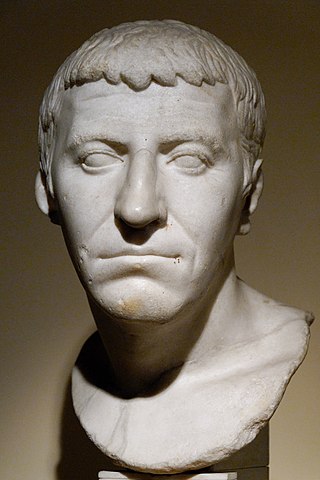Related Research Articles

Antonia the Elder was a niece of the first Roman emperor, Augustus, being the eldest daughter of Octavia the Younger and her second husband, the Triumvir Mark Antony. She married Lucius Domitius Ahenobarbus and became the paternal grandmother of the emperor Nero.

Gnaeus Domitius Corbulo was a popular Roman general, brother-in-law of the emperor Caligula and father-in-law of Domitian. The emperor Nero, highly fearful of Corbulo's reputation, ordered him to commit suicide, which the general carried out faithfully, exclaiming "Axios", meaning "I am worthy", and fell on his own sword.

Gnaeus Domitius Ahenobarbus was a member of the imperial Julio-Claudian dynasty of Ancient Rome. Domitius was the son of Antonia Major. He married Agrippina the Younger and became the father of the emperor Nero.
Aemilia Lepida is a Latin feminine given name that was given to the daughters of various Aemilius Lepiduses, men belonging to the Lepidus branch of the Aemilia gens (family) that was founded by the Marcus Aemilius Lepidus who served as consul in 285 BC. The Aemila Lepidas who appear in Roman historians were principally known for their engagements and marriages, with those in the late Republic and early Empire related to the Julio-Claudian dynasty.
Marcus Valerius Messalla Messallinus was a Roman senator who was elected consul for 3 BC.
Mamercus Aemilius Scaurus was a Roman rhetorician, poet and senator. Tacitus writes that Scaurus was "a man of distinguished rank and ability as an advocate, but of infamous life." He was suffect consul from July to the end of the year AD 21, with Gnaeus Tremellius as his colleague.
Lucius Cornelius Sulla was a Roman senator of the Augustan age. He was ordinary consul as the colleague of Augustus in 5 BC. The only other office attested for him was as a member of the Septemviri epulonum, which he was co-opted into after his praetorship.
Lucius Aemilius Paullus was the son of Paullus Aemilius Lepidus and Cornelia, the elder daughter of Scribonia. He was married to Julia the Younger, the eldest granddaughter of the Emperor Augustus.
Appius Junius Silanus, whom Cassius Dio calls Gaius Appius Silanus, was consul in AD 28, with Publius Silius Nerva as his colleague. He was accused of majestas, or treason, in AD 32 along with a number of senators, but he and Gaius Calvisius Sabinus were saved by one of the informers, Celsus, a tribune of a city cohort.

Lucius Domitius Ahenobarbus was the son of consul Gnaeus Domitius Ahenobarbus and Aemilia Lepida. His mother was a paternal relative of the triumvir Marcus Aemilius Lepidus. His paternal grandmother was Porcia. Ahenobarbus married Antonia Major and through his son with her he became the grandfather of emperor Nero.
Publius Cornelius Scipio was a Roman senator active during the Principate. He was consul in 16 BC as the colleague of Lucius Domitius Ahenobarbus. He was also proconsular governor of Asia, probably around the years 8/7 BC.
Gnaeus Cornelius Lentulus Gaetulicus was a Roman senator and general. He was ordinary consul in the year 26 with Gaius Calvisius Sabinus as his colleague. Gaetulicus was involved in a plot against the emperor Caligula, and following its discovery he was executed.

Lucius Volusius Saturninus was a Roman senator from the powerful plebeian Volusia gens, or family. He held several offices in the emperor's service. Saturninus attracted the attention of his contemporaries for his long life: he died at the age of 93, and having sired a son at the age of 62.
Marcus Plautius Silvanus was a Roman politician and general active during the Principate. He was consul in 2 BC as the colleague of the emperor Augustus.
Faustus Cornelius Sulla was a Roman senator who lived during the reign of the emperor Tiberius. He was suffect consul in AD 31 with Sextus Tedius Valerius Catullus as his colleague. Faustus was the son of Sulla Felix, a member of the Arval Brethren who died in AD 21, thus a direct descendant of the dictator Sulla. His mother was Sextia and his brother was Lucius Cornelius Sulla Felix.
Lucius Volusius Saturninus, also known as Lucius Volusius was a Roman Senator from the powerful plebeian Volusia gens, or family. He was a cousin of emperor Tiberius.
Gaius Calvisius Sabinus was a Roman Senator, who was consul in AD 26 as the colleague of Gnaeus Cornelius Lentulus Gaetulicus. During the reign of Caligula, he was accused of conspiring against the emperor, and took his own life rather than submit to a trial.
Marcus Junius Silanus Torquatus was a Roman senator. He was consul in AD 19, with Lucius Norbanus Balbus as his colleague.
Servius Cornelius Scipio Salvidienus Orfitus was a Roman senator, and consul ordinarius for the year 51, as the colleague of the emperor Claudius. His father Orfitus was one of the seven sons of Vistilia, a noblewoman who came from a family that had held the praetorship, although some have erroneously stated Servius himself was the husband of Vistilia. He became a member of the gens Cornelia through adoption by an otherwise unknown Servius Cornelius Scipio.
Publius Suillius Rufus was a Roman senator who was active during the Principate. He was notorious for his prosecutions during the reign of Claudius; and he was the husband of the step-daughter of Ovid. Rufus was suffect consul in the nundinium of November-December 41 as the colleague of Quintus Ostorius Scapula.
References
- ↑ Attilio Degrassi, I fasti consolari dell'Impero Romano dal 30 avanti Cristo al 613 dopo Cristo (Rome, 1952), p. 10
- ↑ Ronald Syme, The Augustan Aristocracy (Oxford: Clarendon Press, 1986), p. 267
- ↑ Syme, Augustan Aristocracy, p. 267
- ↑ Tacitus, Annales III.31
- ↑ Syme, Augustan Aristocracy, p. 261
- ↑ AE 1927, 172
- ↑ Syme, Augustan Aristocracy, p. 172